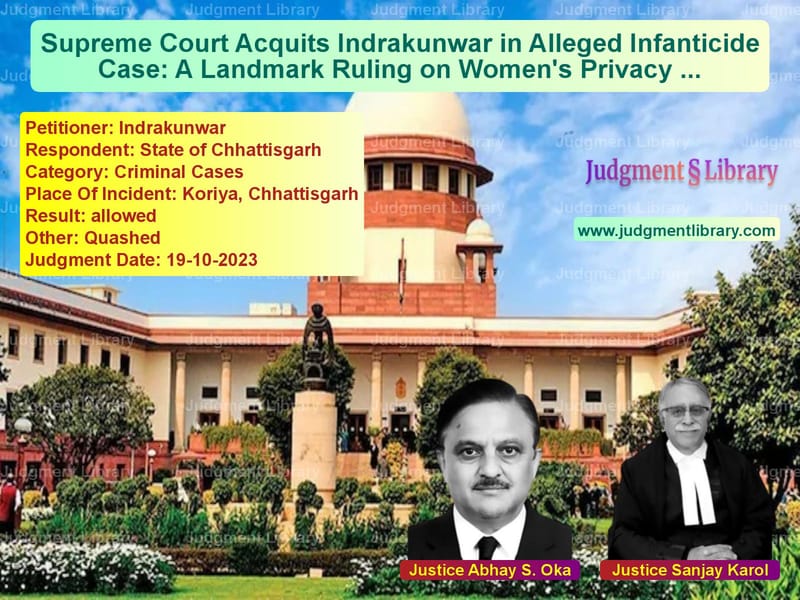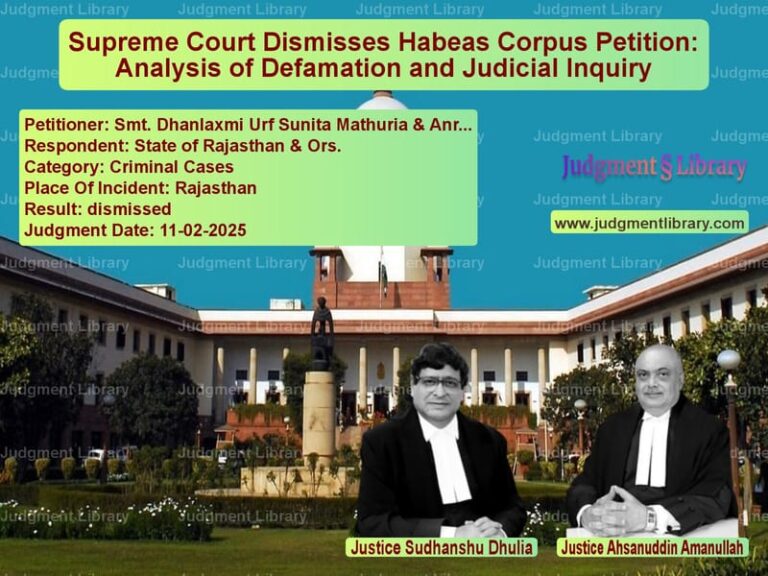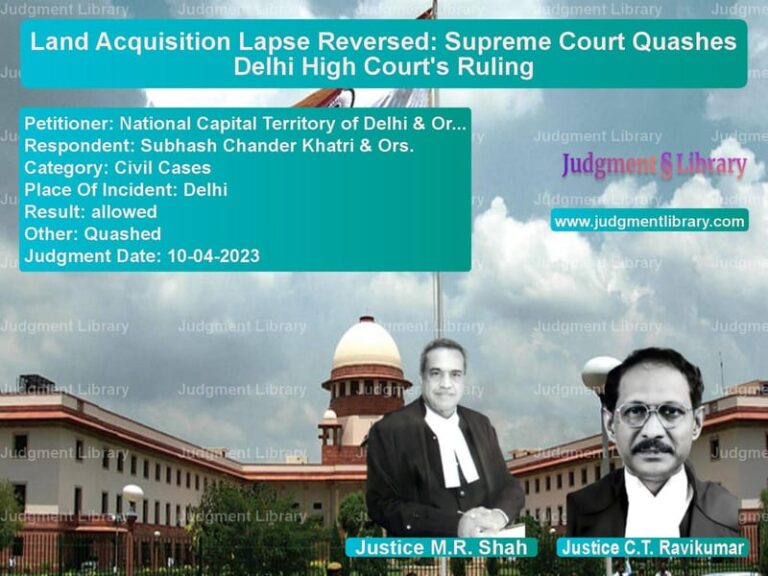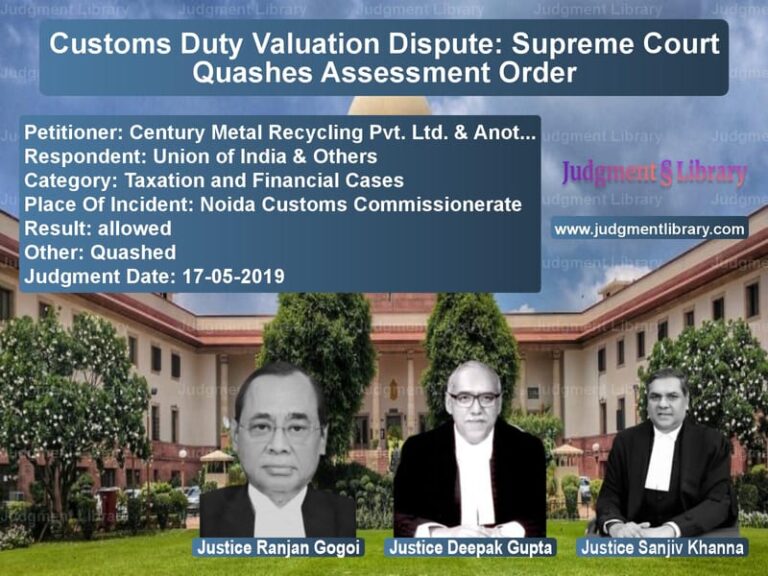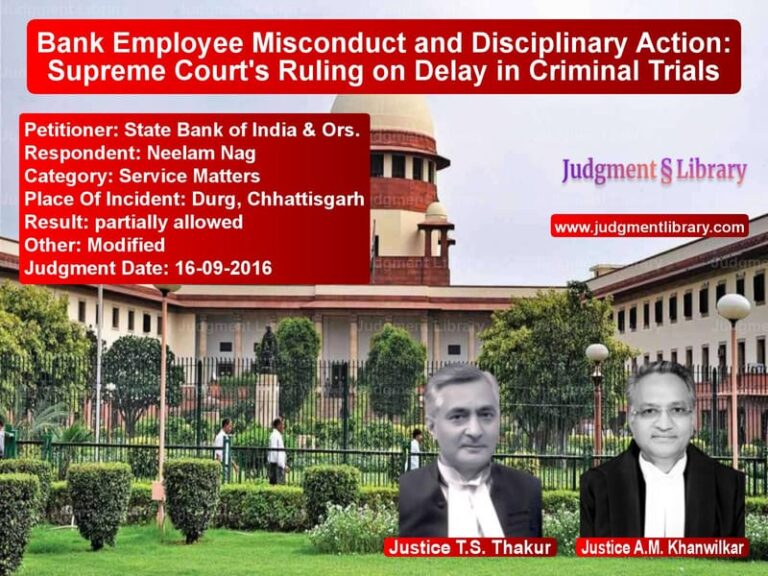Supreme Court Acquits Indrakunwar in Alleged Infanticide Case: A Landmark Ruling on Women’s Privacy and Rights
The Supreme Court of India recently delivered a significant verdict in the case of Indrakunwar vs. State of Chhattisgarh, overturning a conviction under Section 302 of the Indian Penal Code (IPC). The judgment highlights key issues of women’s privacy, reproductive rights, and evidentiary burden in circumstantial cases. The case centered on whether Indrakunwar, accused of killing her newborn, could be convicted based solely on circumstantial evidence, particularly when no direct evidence linked her to the alleged crime.
Background of the Case
Indrakunwar, a resident of a village in Chhattisgarh, was accused of infanticide. According to the prosecution, she had an alleged relationship with a co-villager named Baiga Gond and became pregnant. She was suspected of having delivered a child and subsequently killed it by throwing the newborn into a nearby pond (dabri).
The case was initiated based on an FIR registered on September 14, 2004, when the dead body of a newborn was found floating in the pond. The police arrested Indrakunwar, and a chargesheet was filed under Section 302 IPC. She was convicted by the Trial Court and sentenced to life imprisonment. The conviction was later upheld by the Chhattisgarh High Court, leading to her appeal before the Supreme Court.
Read also: https://judgmentlibrary.com/criminal-case-dismissed-supreme-court-overturns-section-319-crpc-order/
Arguments by the Petitioner – Indrakunwar
Indrakunwar’s defense argued:
- No Direct Evidence: The prosecution had no eyewitnesses or forensic evidence linking her to the child’s death.
- Violation of Privacy and Autonomy: She was convicted largely on the assumption that because she was pregnant, she must have given birth and killed the child.
- Failure to Establish Maternal Link: The prosecution failed to prove that the deceased child was hers.
- Misuse of Circumstantial Evidence: The evidence presented was based on societal assumptions rather than concrete proof.
- Alternative Explanation: She claimed that her alleged partner, Baiga Gond, had tried to force her to take medicine to abort the pregnancy and later pushed her into the pond, leading to a miscarriage.
Arguments by the Respondent – State of Chhattisgarh
The State countered:
- Indrakunwar Was Last Seen Pregnant: Witnesses had allegedly seen her with signs of pregnancy.
- Newborn’s Body Found in a Nearby Pond: This was cited as strong circumstantial evidence.
- Medical Evidence Indicated a Recent Delivery: A doctor testified that Indrakunwar had recently given birth.
- Failure to Explain Pregnancy Outcome: The State argued that her silence on what happened to the child indicated guilt.
Key Observations by the Supreme Court
The Supreme Court extensively reviewed the evidence and found several inconsistencies:
1. Failure to Establish Guilt Beyond Reasonable Doubt
The Court reaffirmed the principle that in circumstantial cases, the chain of evidence must be complete and conclusive. It stated:
“The conviction recorded against the convict-appellant is entirely based on mere presumption, with the actual evidence on record failing to establish the prosecution’s case beyond reasonable doubt.”
2. Right to Privacy and Bodily Autonomy
The Court emphasized that a woman has no obligation to disclose her pregnancy or its outcome, particularly when the prosecution fails to prove its case. It noted:
“The right to privacy is inviolable. The view taken by the lower courts lays to waste such a right inherent in the convict-appellant.”
3. No Direct Link Between the Accused and the Deceased Child
The Court found that there was no forensic or DNA evidence establishing that the newborn was actually Indrakunwar’s child.
4. Social Bias and Gender Stereotypes
The judgment criticized the approach of the lower courts, stating:
“The conclusion drawn is simply on the basis that the convict-appellant was a woman living alone and had been pregnant. Such a view reinforces cultural stereotypes and gendered identities, which this Court explicitly warns against.”
5. Misuse of Circumstantial Evidence
The Court reiterated the importance of stringent standards in circumstantial cases, citing past precedents. It ruled that the case lacked:
- Direct eyewitnesses
- Scientific evidence linking the accused to the crime
- Clear motive or intent
Supreme Court’s Final Ruling
After reviewing all aspects, the Supreme Court ruled:
- Conviction Overturned: The judgment of the High Court was set aside.
- Acquittal Ordered: Indrakunwar was acquitted of all charges and ordered to be released immediately.
- Right to Privacy Recognized: The ruling reinforced that a woman cannot be forced to explain her reproductive choices.
Implications of the Judgment
The judgment sets a precedent for cases involving gender-based legal assumptions and circumstantial evidence. Its key implications include:
- Protection of Women’s Rights: Recognizing bodily autonomy and the right to privacy in legal proceedings.
- Higher Burden of Proof: Prosecutors must ensure forensic or direct evidence in cases involving circumstantial evidence.
- Prevention of Gender Stereotyping: Courts cannot convict based on societal biases regarding women’s behavior.
Conclusion
The Supreme Court’s ruling in Indrakunwar vs. State of Chhattisgarh is a landmark judgment that protects women’s rights against legal overreach. By reinforcing the need for strong evidence in criminal cases and rejecting gender biases, the Court has upheld the fundamental principles of justice and individual autonomy.
Petitioner Name: Indrakunwar.Respondent Name: State of Chhattisgarh.Judgment By: Justice Abhay S. Oka, Justice Sanjay Karol.Place Of Incident: Koriya, Chhattisgarh.Judgment Date: 19-10-2023.
Don’t miss out on the full details! Download the complete judgment in PDF format below and gain valuable insights instantly!
Download Judgment: indrakunwar-vs-state-of-chhattisgar-supreme-court-of-india-judgment-dated-19-10-2023.pdf
Directly Download Judgment: Directly download this Judgment
See all petitions in Murder Cases
See all petitions in Judicial Review
See all petitions in Fundamental Rights
See all petitions in Judgment by Abhay S. Oka
See all petitions in Judgment by Sanjay Karol
See all petitions in allowed
See all petitions in Quashed
See all petitions in supreme court of India judgments October 2023
See all petitions in 2023 judgments
See all posts in Criminal Cases Category
See all allowed petitions in Criminal Cases Category
See all Dismissed petitions in Criminal Cases Category
See all partially allowed petitions in Criminal Cases Category

